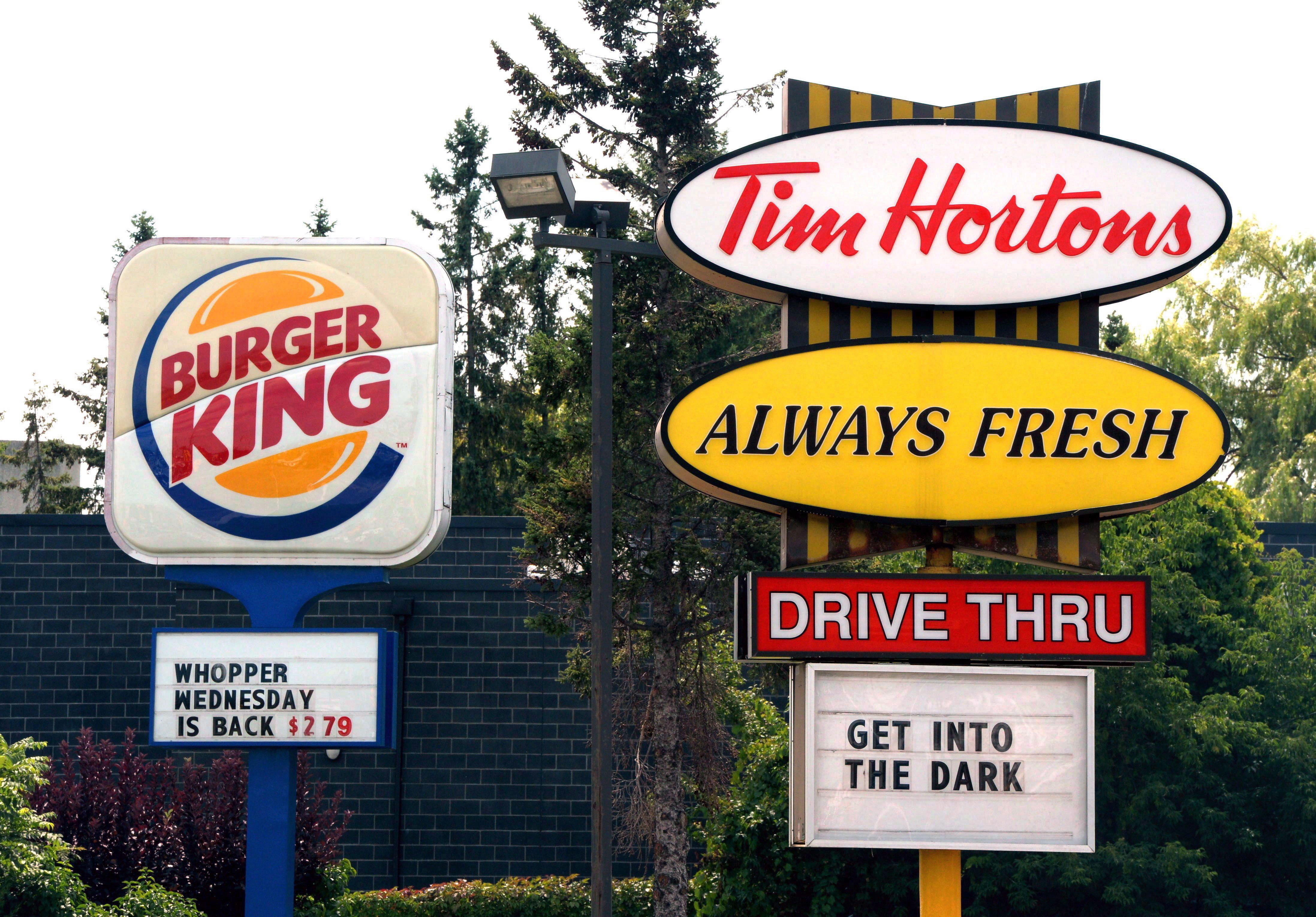Nov 30, 2021
Tim Hortons facing 'hiring crisis,' interviews, leaked emails show
Leaked emails and interviews reveal Tim Hortons is facing a 'hiring crisis' tied to wage issues
At the Tim Hortons location in suburban Ontario where she spends most days of every week, Natalia sees three things written in cursive on the large windows by the entrance.
“Equity. Inclusion. Humanity.”
The Burlington teen has read those words for weeks now. At first, they looked nice.
Now, she says, she feels uneasy when she glances at them at the start and end of her shifts. “None of those words feel true to my experience,” she said. “They haven’t for a while now.”

Natalia is thinking about quitting her job this week because she does not believe she’s getting paid enough.
In fact, she says she hasn’t seen a wage increase in the last two years, despite working several years at the location. And when she asked for a raise, Natalia said she was brushed off.
But she's not the only worker facing this type of situation at a Tim Hortons store. Nor are labour challenges unique to Canada’s most-recognized coffee franchise.
Employment concerns are affecting almost every level of work and type of business, with Statistics Canada reporting last week that there were more than 1 million job vacancies across the country at the start of September. Almost one in five of those unfilled jobs were in the accommodation and food services sector, which accounted for 196,100 vacancies.
As it happens, general managers at several Tim Hortons in Ontario have been discussing a “hiring crisis” for weeks, according to 27 different threads of obtained and verified emails.
The leaked correspondence and more than two dozen interviews recently conducted by BNN Bloomberg paint the picture of a company that’s facing a dearth of new workers and difficulty retaining staff in at least 22 Tim Hortons locations ahead of the holiday season.
Most of them are suburban stores outside major city zones in the Greater Toronto Area that are seeing customer traffic return in droves after the pandemic-led downturn, which is creating more pressure for workers at those locations. Indeed, that resurgence has been evident in recent quarterly results, which show sales at Tim Hortons stores that have been open for at least a year surged 8.9 per cent in the third quarter.

And while other challenges such as staff burnout were also discussed in emails, ostensibly, much of the labour-shortage concerns boil down to stagnant wages and uneven pay across locations — something Tim Hortons headquarters said it does not interfere with.
That’s because the company says, out of 4,000 stores in Canada, only two are corporate-owned versus all the others run independently. And those two are “used primarily for training and testing new products and equipment.”
WAGES NOT REGULATED, TIM HORTONS SAYS
There are no protocols in place for franchise management to ensure wages are on par across Tim Hortons locations, nor are there any set mandates for annual wage increases.
Instead, a Tim Hortons spokesperson said, there is a sharing of “best practices.”
“We think it’s important that you note that our 4,000 Tim Hortons restaurants are owned and operated by 1,500 restaurant owners across Canada,” wrote Communications Manager Meghan Giffin in response to questions from BNN Bloomberg. “So you can imagine that there is a wide range of salary levels and annual salary increases across our system.”
Giffin declined to provide salary numbers within the range she mentioned.
“Even though hiring and retaining team members in the restaurants is something that is handled directly by our restaurant owners," she said, "the leadership team has been meeting with restaurant owners to design recruitment campaigns and share best practices across the country of owners that have had great success in attracting talent.”
However, interviews with team members from many Tim Hortons locations reveal those unmandated “best practices” toward wages are fleeting at best. And they are causing pay disparities between individuals who work at the same store.
BNN Bloomberg is not identifying these workers because they face the possibility of losing their jobs or other repercussions. Like Natalia, they have been provided pseudonyms so they can speak out about their experiences.
WORKERS HIRED TOGETHER, PAID DIFFERENTLY
When 21-year-old university student Vishal was hired at a Tim Hortons location within the same week as another co-worker in Brampton last year, he had the expectation that they would be paid at the same wage rate per hour.
A few months later, he found out that his co-worker was making 20 more cents per hour compared to him.
“It might be a little difference to many people, but it all adds up for someone who is doing a minimum-wage job. For me, it was shocking,” he said. “I could not believe it, because I don’t understand how that was possible.”
This incident is not isolated. According to documents viewed by BNN Bloomberg, at least three such wage disparity occurrences can be identified at three other locations — one more in Brampton, and two in Mississauga.
At one of the Mississauga locations, another layer was added to the disparity. Two workers at the same store were not given an annual wage increase and yet one other was, even though all three were hired within the same month in 2019, according to documents provided by two of the workers which were corroborated by the third employee.
In that case, the two workers’ complaints were met with what they described as a “gaslighting situation,” whereby their owner-operators accused them of “creating something of nothing,” they said.
Those workers say they asked their boss if there was an avenue to make an official complaint at the franchise headquarters, and were told no such mechanisms exist.
Tim Hortons would not confirm or deny whether there is a way for workers at stores to inform upper franchise management for wage discrepancies; however, two franchisees who spoke with BNN Bloomberg confirmed that there isn't a formal mechanism to lodge a complaint with upper management.
“The entire restaurant, retail and hospitality sector is very competitive for labour – so our restaurant owners keep a close eye on the labour market and pay competitive wages to attract and retain employees,” spokesperson Giffin wrote.
“Our leadership team has been and continues to remain hands on by working directly with restaurant owners across Canada ensuring they feel supported and are operating successfully.”
Asked how not having protocols to inform corporate headquarters about wage discrepancies could or could not bring rise to potential issues, a Tim Hortons statement read: "It’s normal to see a range of wages exist within an individual restaurant, based on tenure, performance and role — just like any other workplace."

HIRING CHALLENGING, BUT NOT CRISIS: TIM HORTONS OWNER-OPERATORS
Giffin connected BNN Bloomberg with two Tim Hortons owner-operators who run multiple locations in different parts of Ontario.
“There are many examples of restaurant owners paying premiums on top of minimum wage to attract and retain team members and to be competitive in their individual markets across Ontario and Canada,” Giffin said, adding those two franchisees could provide comments “reflective of the above.”
Janet Trude, one of those owners, said her locations — in Collingwood, Midland and Wasaga Beach — go above and beyond by offering incentives such as scholarships, help with affordable housing and paying more than the minimum wage to attract and retain workers.
Trude said she’s been in the business for more than 35 years and sits on the labour committee coordinated by Restaurant Brands International Inc., the American-Canadian multinational fast-food holding company that has owned Tim Hortons Inc. as a subsidiary since 2014.
“RBI has put together a great national campaign,” said Trude. “We’re sending out weekly best practices — what the stores that have the lowest turnover are doing, to try and encourage people to carry on the same way.”
But when asked if the committee has established any direct guidance or mandated wage protocols to ensure congruence across locations, Trude said, “not at this point.”
“We don’t really look at anyone else’s wage grid. But if someone asks the question, as an advisory person, I definitely share my best practices.”
Amit Seth, the other franchisee, whose family owns Tim Hortons locations around the Greater Toronto Area, said he operates his stores in a similar way.
Trude and Seth said hiring has been a challenge in the past few months, but they don’t believe the words “hiring crisis” accurately reflect what is happening at their locations.
“We’re not necessarily different from what any other employer or business is facing,” said Seth. “We were in a worse-off state, let’s call it in September, than where we are now. And I think it’s just more of a timing shift of getting the right individuals and doing the proper training to help meet the unexpected increase in guest demand that’s been missing in action.”
However, emails obtained by BNN Bloomberg showing conversations between store managers and in some cases owner-operators, reveal a different reality for many locations in Ontario than what Trude and Seth described at their locations.
According to those emails, managers have repeatedly told owner-operators they would like to see increased wages for unsatisfied team members, with many of them outright dismissed and others ignored.
In one case, a Tim Hortons manager at a Mississauga location told her owner no one had been applying for job openings for weeks and that she routinely has to pick up the slack for “never-ending drive-thru customers.”
And in another case, three managers are copied into the same email chain, with all of them using the words “hiring crisis” repeatedly to describe their woes and talking about a “major exodus of current staff” at three separate locations — two in Caledon and one in Mississauga.
Their owner-operator wrote back to all of them stating, “it is too bad that workers are leaving, but it is impossible to increase our pay right now because we need to stay competitive and make back the money we lost during Covid.”
‘UNPRECEDENTED TIMES’ FOR STAFFING: RESTAURANT BRANDS INTERNATIONAL CEO
In a recent interview, Restaurant Brands International Chief Executive Officer José Cil said many franchise chains under his company — Burger King and Popeyes Louisiana Chicken along with Tim Hortons — are “facing unprecedented times in terms of staffing opportunities.”
“There’s pockets around the country and around North America,” he said, when asked whether the hiring situation is better in some locations compared to others.
“But still, a big priority for our franchisees all around North America is to find, attract and retain great talent for our restaurants. It’s the same for our supply chain and our distribution business.”
For now, Giffin said Tim Hortons’ focus remains on “providing a great experience for our guests.”
“And we know that our restaurant owners are totally committed to providing a great employment experience for their restaurant team members,” she added.


